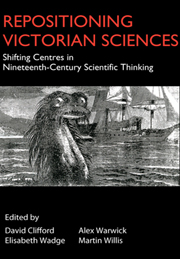Book contents
- Frontmatter
- Contents
- Notes on Contributors
- 1 Margins and Centres
- SECTION I Shifted Centres
- SECTION II Contested Knowledges
- 7 ‘Supposed Differences’: Lydia Becker and Victorian Women's Participation in the BAAS
- 8 A Fair Trial for Spiritualism?: Fighting Dirty in the Pall Mall Gazette
- 9 ‘This is Ours and For Us’: The Mechanic's Magazine and Low Scientific Culture in Regency London
- 10 How did the Conservation of Energy Become ‘The Highest Law in All Science’?
- 11 ‘Scriptural Geology’, Vestiges of the Natural History of Creation and Contested Authority in Nineteenth-Century British Science
- 12 ‘This House is a Temple of Research’: Country-House Centres for Late Victorian Science
- SECTION III Entering The Modern
- Notes
- Select Bibliography
10 - How did the Conservation of Energy Become ‘The Highest Law in All Science’?
from SECTION II - Contested Knowledges
Published online by Cambridge University Press: 05 March 2012
- Frontmatter
- Contents
- Notes on Contributors
- 1 Margins and Centres
- SECTION I Shifted Centres
- SECTION II Contested Knowledges
- 7 ‘Supposed Differences’: Lydia Becker and Victorian Women's Participation in the BAAS
- 8 A Fair Trial for Spiritualism?: Fighting Dirty in the Pall Mall Gazette
- 9 ‘This is Ours and For Us’: The Mechanic's Magazine and Low Scientific Culture in Regency London
- 10 How did the Conservation of Energy Become ‘The Highest Law in All Science’?
- 11 ‘Scriptural Geology’, Vestiges of the Natural History of Creation and Contested Authority in Nineteenth-Century British Science
- 12 ‘This House is a Temple of Research’: Country-House Centres for Late Victorian Science
- SECTION III Entering The Modern
- Notes
- Select Bibliography
Summary
Because science was becoming a professional enterprise in the nineteenth century, an inquiry into the ‘centrality’ or ‘marginality’ of scientific ideas at mid-century entails two separate questions. First, why did a given idea influence other researchers or fail to influence them? Where professional networks made themselves effective gatekeepers of credibility, this becomes in the first instance a question about the functioning of those networks. But there was also a popular audience for scientific ideas, and another way to assess the perceived ‘centrality’ of a scientific discourse would be to ask how well it was known to this broader community, and why they regarded it as fundamental or incidental to the scientific enterprise. By the later nineteenth century, this is less a question about the validation of competing claims than about the apportionment of finite public awareness. The universe of authenticated science was growing large; in the general-interest monthlies and nascent magazines of ‘popular science’, new ideas competed for attention with hagiographic surveys of past achievement. Many claims regarded as credible by researchers were nevertheless ignored by the reading public. For a new idea to be celebrated as a groundbreaking discovery, it needed to possess not only credibility but visible social implications. Indeed, popularizers often promoted scientific ideas by converting statements about nature into statements about human society.
- Type
- Chapter
- Information
- Repositioning Victorian SciencesShifting Centres in Nineteenth-Century Thinking, pp. 119 - 130Publisher: Anthem PressPrint publication year: 2006



